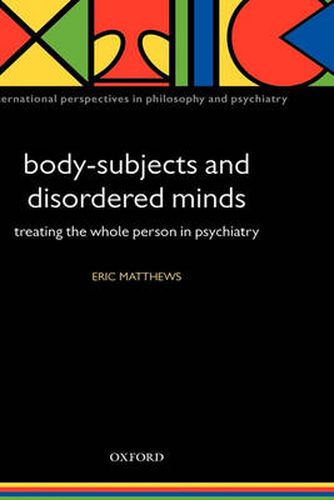Readings Newsletter
Become a Readings Member to make your shopping experience even easier.
Sign in or sign up for free!
You’re not far away from qualifying for FREE standard shipping within Australia
You’ve qualified for FREE standard shipping within Australia
The cart is loading…






How should we deal with mental disorder - as an illness like diabetes or bronchitis, as a problem in living , or what? This book seeks to answer such questions by going to their roots, in philosophical questions about the nature of the human mind, the ways in which it can be understood, and about the nature and aims of scientific medicine. The controversy over the nature of mental disorder and the appropriateness of the medical model is not just an abstract theoretical debate: it has a bearing on very practical issues of appropriate treatment, as well as on psychiatric ethics and law. A major contention of this book is that these questions are ultimately philosophical in character: they can be resolved only if we abandon some widespread philosophical assumptions about the mind and the body , and about what it means for medicine to be scientific . The phenomenological approach of the twentieth-century French philosopher, Maurice Merleau-Ponty is used to question these assumptions. His conception of human beings as body-subjects is argued to provide a more illuminating way of thinking about mental disorder and the ways in which it can be understood and treated. The conditions we conventionally call mental disorders are, it is argued, not a homogeneous group: the standard interpretation of the medical model fits some more readily than others. The core mental disorders, however, are best regarded as disturbed ways of being in the world, which cause unhappiness because of deviation from human rather than straightforwardly biological norms. That is, they are problems in how we experience the world and especially other people, rather than in physiological functioning - even though the nature of our experience cannot ultimately be separated from the ways in which our bodies function. This analysis is applied within the book both to issues in clinical treatment and to the special ethical and legal questions of psychiatry. Written by a well known philosopher in an accessible and clear style, this book should be of interest to a wide range of readers, from psychiatrists to social workers, lawyers, ethicists, philosophers and anyone with an interest in mental health.
$9.00 standard shipping within Australia
FREE standard shipping within Australia for orders over $100.00
Express & International shipping calculated at checkout
How should we deal with mental disorder - as an illness like diabetes or bronchitis, as a problem in living , or what? This book seeks to answer such questions by going to their roots, in philosophical questions about the nature of the human mind, the ways in which it can be understood, and about the nature and aims of scientific medicine. The controversy over the nature of mental disorder and the appropriateness of the medical model is not just an abstract theoretical debate: it has a bearing on very practical issues of appropriate treatment, as well as on psychiatric ethics and law. A major contention of this book is that these questions are ultimately philosophical in character: they can be resolved only if we abandon some widespread philosophical assumptions about the mind and the body , and about what it means for medicine to be scientific . The phenomenological approach of the twentieth-century French philosopher, Maurice Merleau-Ponty is used to question these assumptions. His conception of human beings as body-subjects is argued to provide a more illuminating way of thinking about mental disorder and the ways in which it can be understood and treated. The conditions we conventionally call mental disorders are, it is argued, not a homogeneous group: the standard interpretation of the medical model fits some more readily than others. The core mental disorders, however, are best regarded as disturbed ways of being in the world, which cause unhappiness because of deviation from human rather than straightforwardly biological norms. That is, they are problems in how we experience the world and especially other people, rather than in physiological functioning - even though the nature of our experience cannot ultimately be separated from the ways in which our bodies function. This analysis is applied within the book both to issues in clinical treatment and to the special ethical and legal questions of psychiatry. Written by a well known philosopher in an accessible and clear style, this book should be of interest to a wide range of readers, from psychiatrists to social workers, lawyers, ethicists, philosophers and anyone with an interest in mental health.